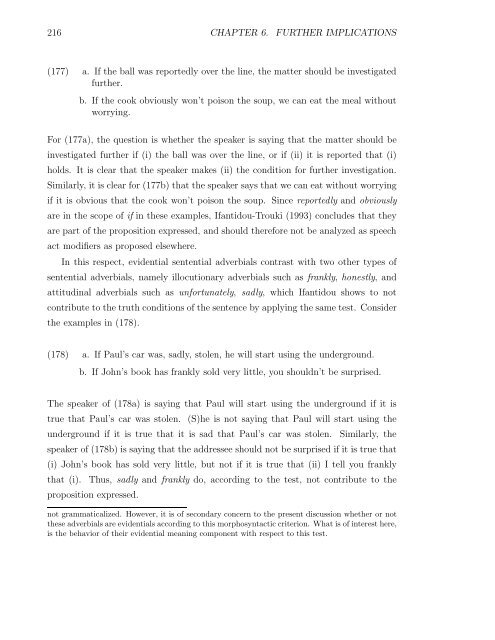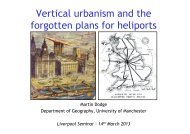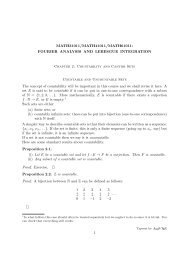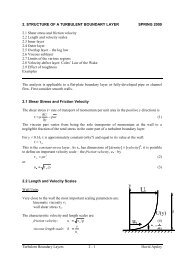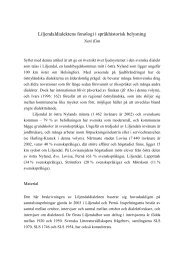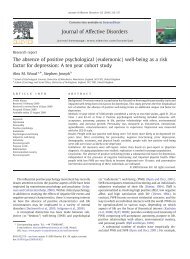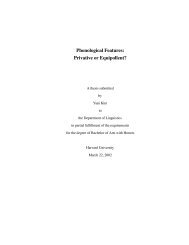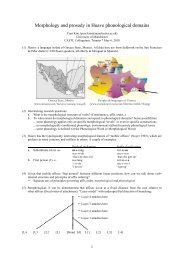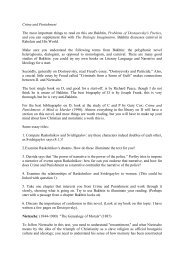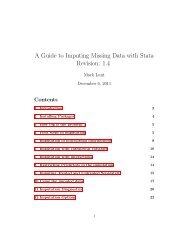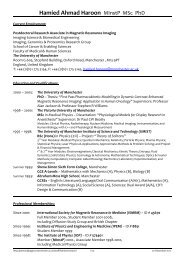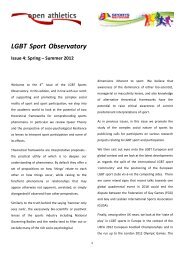- Page 1 and 2:
SEMANTICS AND PRAGMATICS OF EVIDENT
- Page 3:
I certify that I have read this dis
- Page 6 and 7:
to or modify the sincerity conditio
- Page 8 and 9:
I thank Cleo Condoravdi for accepti
- Page 10 and 11:
thank Cathryn and Shiao-Wei for pro
- Page 12 and 13:
in fact lost the phoneme represente
- Page 14 and 15:
-ru/-ra (v) hort hortative -man (n)
- Page 16 and 17:
2 Evidential Hierarchies 39 2.1 Int
- Page 18 and 19:
6 Further Implications 205 6.1 Intr
- Page 20 and 21:
2 CHAPTER 1. INTRODUCTION AND MAIN
- Page 22 and 23:
4 CHAPTER 1. INTRODUCTION AND MAIN
- Page 24 and 25:
6 CHAPTER 1. INTRODUCTION AND MAIN
- Page 26 and 27:
8 CHAPTER 1. INTRODUCTION AND MAIN
- Page 28 and 29:
10 CHAPTER 1. INTRODUCTION AND MAIN
- Page 30 and 31:
12 CHAPTER 1. INTRODUCTION AND MAIN
- Page 32 and 33:
14 CHAPTER 1. INTRODUCTION AND MAIN
- Page 34 and 35:
16 CHAPTER 1. INTRODUCTION AND MAIN
- Page 36 and 37:
18 CHAPTER 1. INTRODUCTION AND MAIN
- Page 38 and 39:
20 CHAPTER 1. INTRODUCTION AND MAIN
- Page 40 and 41:
22 CHAPTER 1. INTRODUCTION AND MAIN
- Page 42 and 43:
24 CHAPTER 1. INTRODUCTION AND MAIN
- Page 44 and 45:
26 CHAPTER 1. INTRODUCTION AND MAIN
- Page 46 and 47:
28 CHAPTER 1. INTRODUCTION AND MAIN
- Page 48 and 49:
30 CHAPTER 1. INTRODUCTION AND MAIN
- Page 50 and 51:
32 CHAPTER 1. INTRODUCTION AND MAIN
- Page 52 and 53:
34 CHAPTER 1. INTRODUCTION AND MAIN
- Page 54 and 55:
36 CHAPTER 1. INTRODUCTION AND MAIN
- Page 56 and 57:
38 CHAPTER 1. INTRODUCTION AND MAIN
- Page 58 and 59:
40 CHAPTER 2. EVIDENTIAL HIERARCHIE
- Page 60 and 61:
42 CHAPTER 2. EVIDENTIAL HIERARCHIE
- Page 62 and 63:
44 CHAPTER 2. EVIDENTIAL HIERARCHIE
- Page 64 and 65:
46 CHAPTER 2. EVIDENTIAL HIERARCHIE
- Page 66 and 67:
48 CHAPTER 2. EVIDENTIAL HIERARCHIE
- Page 68 and 69:
50 CHAPTER 2. EVIDENTIAL HIERARCHIE
- Page 70 and 71:
52 CHAPTER 2. EVIDENTIAL HIERARCHIE
- Page 72 and 73:
54 CHAPTER 2. EVIDENTIAL HIERARCHIE
- Page 74 and 75:
56 CHAPTER 2. EVIDENTIAL HIERARCHIE
- Page 76 and 77:
58 CHAPTER 2. EVIDENTIAL HIERARCHIE
- Page 78 and 79:
60 CHAPTER 2. EVIDENTIAL HIERARCHIE
- Page 80 and 81:
62 CHAPTER 2. EVIDENTIAL HIERARCHIE
- Page 82 and 83:
64 CHAPTER 2. EVIDENTIAL HIERARCHIE
- Page 84 and 85:
66 CHAPTER 2. EVIDENTIAL HIERARCHIE
- Page 86 and 87:
68 CHAPTER 2. EVIDENTIAL HIERARCHIE
- Page 88 and 89:
70 CHAPTER 2. EVIDENTIAL HIERARCHIE
- Page 90 and 91:
72 CHAPTER 2. EVIDENTIAL HIERARCHIE
- Page 92 and 93:
74 CHAPTER 2. EVIDENTIAL HIERARCHIE
- Page 94 and 95:
76 CHAPTER 2. EVIDENTIAL HIERARCHIE
- Page 96 and 97:
78 CHAPTER 2. EVIDENTIAL HIERARCHIE
- Page 98 and 99:
80 CHAPTER 3. EVIDENTIALITY AND EPI
- Page 100 and 101:
82 CHAPTER 3. EVIDENTIALITY AND EPI
- Page 102 and 103:
84 CHAPTER 3. EVIDENTIALITY AND EPI
- Page 104 and 105:
86 CHAPTER 3. EVIDENTIALITY AND EPI
- Page 106 and 107:
88 CHAPTER 3. EVIDENTIALITY AND EPI
- Page 108 and 109:
90 CHAPTER 3. EVIDENTIALITY AND EPI
- Page 110 and 111:
92 CHAPTER 3. EVIDENTIALITY AND EPI
- Page 112 and 113:
94 CHAPTER 3. EVIDENTIALITY AND EPI
- Page 114 and 115:
96 CHAPTER 3. EVIDENTIALITY AND EPI
- Page 116 and 117:
98 CHAPTER 3. EVIDENTIALITY AND EPI
- Page 118 and 119:
100 CHAPTER 3. EVIDENTIALITY AND EP
- Page 120 and 121:
102 CHAPTER 3. EVIDENTIALITY AND EP
- Page 122 and 123:
104 CHAPTER 3. EVIDENTIALITY AND EP
- Page 124 and 125:
106 CHAPTER 3. EVIDENTIALITY AND EP
- Page 126 and 127:
108 CHAPTER 3. EVIDENTIALITY AND EP
- Page 128 and 129:
110 CHAPTER 3. EVIDENTIALITY AND EP
- Page 130 and 131:
112 CHAPTER 3. EVIDENTIALITY AND EP
- Page 132 and 133:
114 CHAPTER 3. EVIDENTIALITY AND EP
- Page 134 and 135:
116 CHAPTER 3. EVIDENTIALITY AND EP
- Page 136 and 137:
118 CHAPTER 3. EVIDENTIALITY AND EP
- Page 138 and 139:
120 CHAPTER 3. EVIDENTIALITY AND EP
- Page 140 and 141:
122 CHAPTER 4. BEST POSSIBLE GROUND
- Page 142 and 143:
124 CHAPTER 4. BEST POSSIBLE GROUND
- Page 144 and 145:
126 CHAPTER 4. BEST POSSIBLE GROUND
- Page 146 and 147:
128 CHAPTER 4. BEST POSSIBLE GROUND
- Page 148 and 149:
130 CHAPTER 4. BEST POSSIBLE GROUND
- Page 150 and 151:
132 CHAPTER 4. BEST POSSIBLE GROUND
- Page 152 and 153:
134 CHAPTER 4. BEST POSSIBLE GROUND
- Page 154 and 155:
136 CHAPTER 4. BEST POSSIBLE GROUND
- Page 156 and 157:
138 CHAPTER 4. BEST POSSIBLE GROUND
- Page 158 and 159:
140 CHAPTER 4. BEST POSSIBLE GROUND
- Page 160 and 161:
142 CHAPTER 4. BEST POSSIBLE GROUND
- Page 162 and 163:
144 CHAPTER 4. BEST POSSIBLE GROUND
- Page 164 and 165:
146 CHAPTER 4. BEST POSSIBLE GROUND
- Page 166 and 167:
148 CHAPTER 4. BEST POSSIBLE GROUND
- Page 168 and 169:
150 CHAPTER 4. BEST POSSIBLE GROUND
- Page 170 and 171:
152 CHAPTER 4. BEST POSSIBLE GROUND
- Page 172 and 173:
154 CHAPTER 4. BEST POSSIBLE GROUND
- Page 174 and 175:
156 CHAPTER 4. BEST POSSIBLE GROUND
- Page 176 and 177:
158 CHAPTER 4. BEST POSSIBLE GROUND
- Page 178 and 179:
160 CHAPTER 4. BEST POSSIBLE GROUND
- Page 180 and 181:
162 CHAPTER 4. BEST POSSIBLE GROUND
- Page 182 and 183:
164 CHAPTER 4. BEST POSSIBLE GROUND
- Page 184 and 185: 166 CHAPTER 4. BEST POSSIBLE GROUND
- Page 186 and 187: 168 CHAPTER 4. BEST POSSIBLE GROUND
- Page 188 and 189: Chapter 5 Indirect evidentiality 5.
- Page 190 and 191: 172 CHAPTER 5. INDIRECT EVIDENTIALI
- Page 192 and 193: 174 CHAPTER 5. INDIRECT EVIDENTIALI
- Page 194 and 195: 176 CHAPTER 5. INDIRECT EVIDENTIALI
- Page 196 and 197: 178 CHAPTER 5. INDIRECT EVIDENTIALI
- Page 198 and 199: 180 CHAPTER 5. INDIRECT EVIDENTIALI
- Page 200 and 201: 182 CHAPTER 5. INDIRECT EVIDENTIALI
- Page 202 and 203: 184 CHAPTER 5. INDIRECT EVIDENTIALI
- Page 204 and 205: 186 CHAPTER 5. INDIRECT EVIDENTIALI
- Page 206 and 207: 188 CHAPTER 5. INDIRECT EVIDENTIALI
- Page 208 and 209: 190 CHAPTER 5. INDIRECT EVIDENTIALI
- Page 210 and 211: 192 CHAPTER 5. INDIRECT EVIDENTIALI
- Page 212 and 213: 194 CHAPTER 5. INDIRECT EVIDENTIALI
- Page 214 and 215: 196 CHAPTER 5. INDIRECT EVIDENTIALI
- Page 216 and 217: 198 CHAPTER 5. INDIRECT EVIDENTIALI
- Page 218 and 219: 200 CHAPTER 5. INDIRECT EVIDENTIALI
- Page 220 and 221: 202 CHAPTER 5. INDIRECT EVIDENTIALI
- Page 222 and 223: 204 CHAPTER 5. INDIRECT EVIDENTIALI
- Page 224 and 225: 206 CHAPTER 6. FURTHER IMPLICATIONS
- Page 226 and 227: 208 CHAPTER 6. FURTHER IMPLICATIONS
- Page 228 and 229: 210 CHAPTER 6. FURTHER IMPLICATIONS
- Page 230 and 231: 212 CHAPTER 6. FURTHER IMPLICATIONS
- Page 232 and 233: 214 CHAPTER 6. FURTHER IMPLICATIONS
- Page 236 and 237: 218 CHAPTER 6. FURTHER IMPLICATIONS
- Page 238 and 239: 220 CHAPTER 6. FURTHER IMPLICATIONS
- Page 240 and 241: 222 CHAPTER 6. FURTHER IMPLICATIONS
- Page 242 and 243: 224 CHAPTER 6. FURTHER IMPLICATIONS
- Page 244 and 245: 226 CHAPTER 6. FURTHER IMPLICATIONS
- Page 246 and 247: 228 CHAPTER 6. FURTHER IMPLICATIONS
- Page 248 and 249: 230 CHAPTER 6. FURTHER IMPLICATIONS
- Page 250 and 251: 232 CHAPTER 6. FURTHER IMPLICATIONS
- Page 252 and 253: 234 CHAPTER 6. FURTHER IMPLICATIONS
- Page 254 and 255: 236 CHAPTER 6. FURTHER IMPLICATIONS
- Page 256 and 257: 238 CHAPTER 6. FURTHER IMPLICATIONS
- Page 258 and 259: 240 CHAPTER 6. FURTHER IMPLICATIONS
- Page 260 and 261: 242 CHAPTER 6. FURTHER IMPLICATIONS
- Page 262 and 263: 244 CHAPTER 6. FURTHER IMPLICATIONS
- Page 264 and 265: 246 CHAPTER 6. FURTHER IMPLICATIONS
- Page 266 and 267: 248 CHAPTER 6. FURTHER IMPLICATIONS
- Page 268 and 269: 250 CHAPTER 6. FURTHER IMPLICATIONS
- Page 270 and 271: 252 CHAPTER 6. FURTHER IMPLICATIONS
- Page 272 and 273: 254 CHAPTER 6. FURTHER IMPLICATIONS
- Page 274 and 275: 256 CHAPTER 6. FURTHER IMPLICATIONS
- Page 276 and 277: 258 CHAPTER 6. FURTHER IMPLICATIONS
- Page 278 and 279: 260 CHAPTER 7. CONCLUSION three mai
- Page 280 and 281: 262 CHAPTER 7. CONCLUSION is judgin
- Page 282 and 283: 264 CHAPTER 7. CONCLUSION This anal
- Page 284 and 285:
266 CHAPTER 7. CONCLUSION than in Q
- Page 286 and 287:
268 CHAPTER 7. CONCLUSION c. Wayna-
- Page 288 and 289:
270 CHAPTER 7. CONCLUSION discussio
- Page 290 and 291:
272 CHAPTER 7. CONCLUSION represent
- Page 292 and 293:
274 CHAPTER 7. CONCLUSION Thus, the
- Page 294 and 295:
276 CHAPTER 7. CONCLUSION framework
- Page 296 and 297:
278 BIBLIOGRAPHY Belnap, Nuel D., a
- Page 298 and 299:
280 BIBLIOGRAPHY M. Reis (Eds.), Mo
- Page 300 and 301:
282 BIBLIOGRAPHY Ifantidou, Elly. 2
- Page 302 and 303:
284 BIBLIOGRAPHY Nuckolls, Janis B.
- Page 304:
286 BIBLIOGRAPHY Weber, David. 1986


